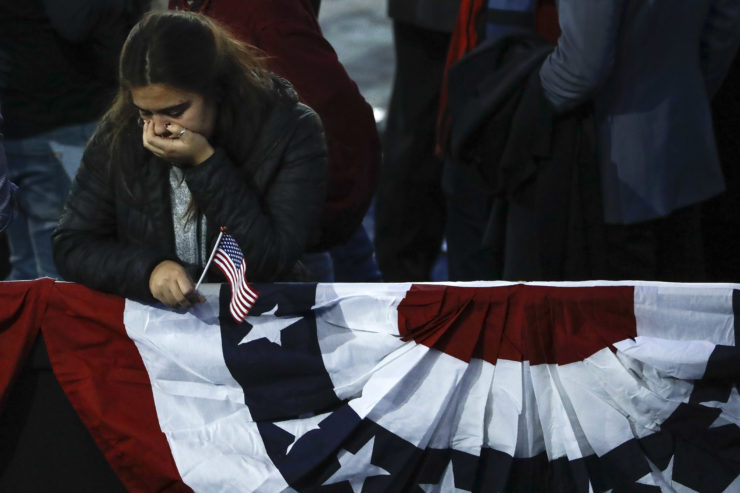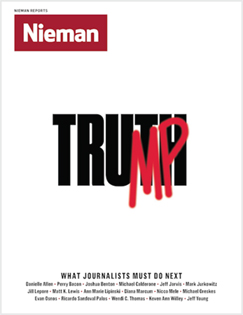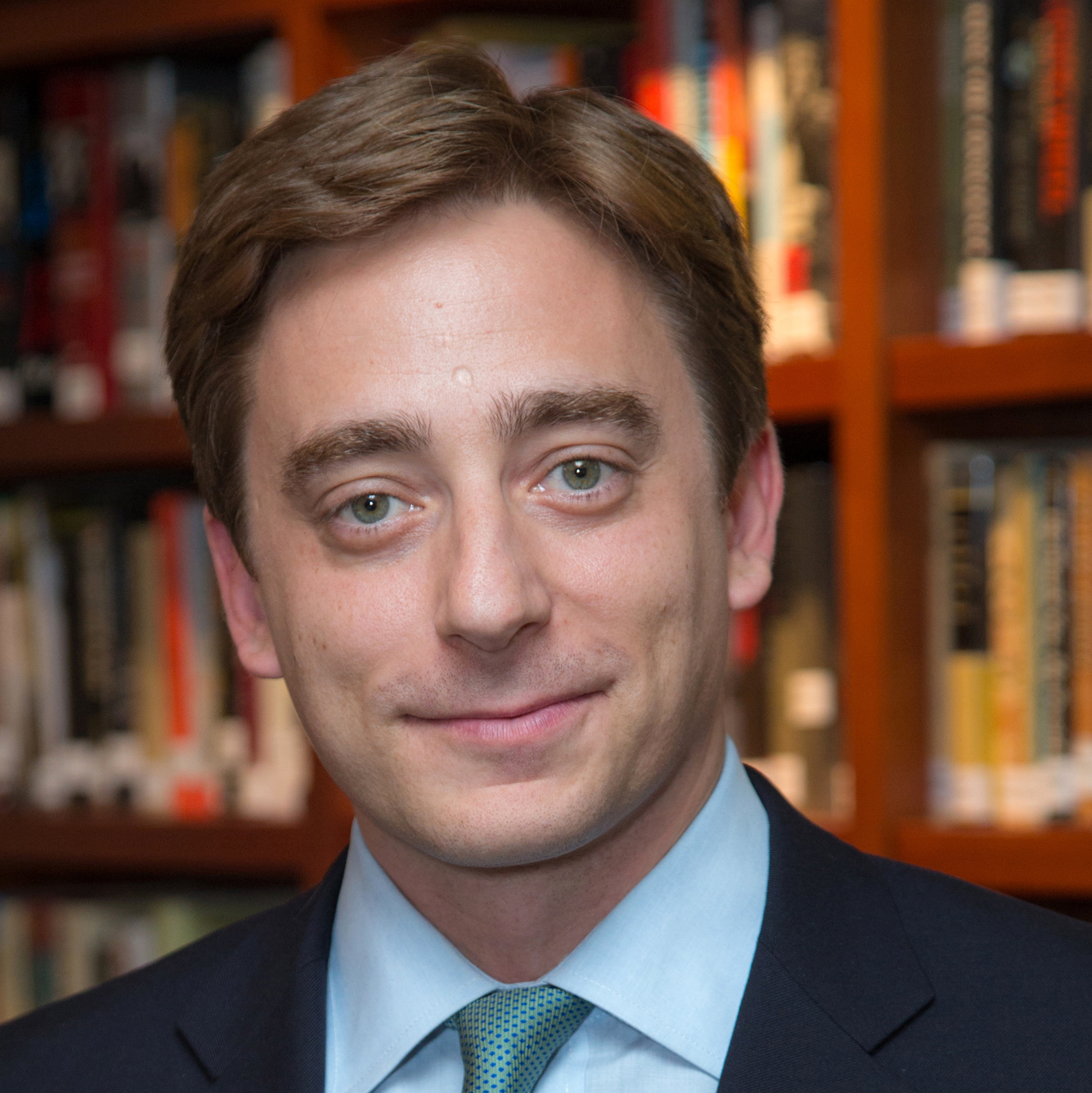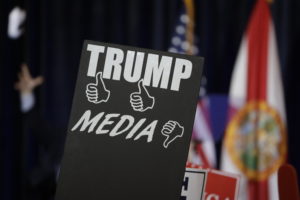
A supporter reacts after hearing that Democratic presidential nominee Hillary Clinton wouldn't be coming to the Jacob Javits Center in New York on election night
Everyone has a story along the lines of mine. At a family gathering in October, I was chatting with a cousin about the campaign, and, since we didn’t see it quite the same way, each of us was speaking delicately. When he informed me that Trump had been “endorsed by Pope Francis,” I said that wasn’t true. He’d seen it on Facebook; he couldn’t recall the news outlet.
Later, I looked it up. “Pope Francis Shocks World, Endorses Donald Trump for President” was an obvious piece of Internet fiction, churned out by a goofy Macedonian website that learned long ago how to monetize clicks by promoting plainly false stories on Facebook. They pursue American marks because American clicks pay four times better than foreign clicks. (For the record, the Pope harshly criticized Trump, saying he is “not Christian.”)
I didn’t think much of the exchange, other than the faint flicker of pity that you feel for someone who falls for, say, a Nigerian email hoax. That was a mistake.
Before the election results were in, when people still thought that Hillary Clinton was going to win, the technology community was pleased to hear people observe how much of this campaign was being conducted and litigated and experienced on social media. Two-thirds of U.S. adults now report getting their news from Facebook, up from 47 percent less than three years ago.
But after the election, at a conference Q&A, Facebook CEO Mark Zuckerberg was asked about the role of his company in featuring and disseminating fake news stories. “Personally I think the idea that fake news on Facebook … influenced the election in any way is a pretty crazy idea,” he said.
That wasn’t much of a surprise; he was going to defend his company. But I suspect that, on some level, Zuckerberg is privately horrified. No, he doesn’t think he helped elect Donald Trump, but he’s too smart and progressive and alert to the nature of our information lives to really believe his company was irrelevant.
And in that sense, this has been an important moment. Much as Zuckerberg and his peers started off hoping they could avoid dealing with Washington bureaucrats too much, they quickly realized that they could not, and they built a large, sophisticated lobbying operation.
This is an extension of that process; they now have additional evidence that they have created enormous, and, in the wrong hands, dangerous power. The crowd is not always wise. With human editors to separate real news from fake, the casual reader—the busy cousin with a job and a toddler to chase—will continue to be duped. Technology development is always a process of iteration, and the technology of news on social media is desperately due for an upgrade. Our technology leaders see themselves as world-changers, and in some ways they are absolutely right. When it comes to facts, it’s not clear if the world is changing for the better.
In the business of information, there are few innocents left by this election. Most serious news organizations were unprepared for a Trump win. Trump supporters say this was because we ignored the white working class. I’d encourage them to read some of the best by Larissa MacFarquhar and George Packer.
No, probably our biggest mistake was the assumption that a lot of people, even among those whom Trump praised as “the poorly educated,” would be turned off by Trump in the end. But it turned out that they kind of liked him, even if they weren’t going to admit that to a stranger on the phone from a polling outfit. Self-consciousness around racial anxiety is not a new problem, and we should have remembered this phenomenon. (Google the “Bradley Effect.”)
Another mistake was misreading how much people hated Hillary Clinton. On the campaign trail, I heard dozens of times a nearly verbatim list of accusations: Benghazi, lies, ambition, untrustworthy, emails. But actually she had become a byword for hatred of Washington, and we underestimated how broadly that was felt. We drifted into a kind of seductive fiction that reading “Hillbilly Elegy” was all you needed to do to understand Trump’s electorate. It was always larger than that.
On Election Day, I went to a polling station in Clifton, Virginia, a prosperous town less than 30 miles from the White House. One person after another told me that they were either voting for Trump—or against Clinton. Both forces prevailed. But, as a community, we pretended for way too long that it was all Appalachian coal workers.
The last and greatest mistake was relying too much on the seductive and fragile science of public-opinion research, even after there was abundant evidence—Brexit, etc.—that polling is a perilous business. No matter how smart you are as a reporter, you are captive to data if only because relying on anecdote over data is an even larger sin. But the numbers on the page were never firm. As they say, garbage in, garbage out.
So, what do we do? We need to get better at polling—or get better at ignoring it. We need to get better at working with technology companies to make accuracy a value that they cherish much the way that we do. And we need to teach people to vet the quality of their news much the way that we teach them to vet their sources for a term paper. That’s a new problem and an urgent one.
On that last point, a couple of months before Election Day, I had a prescient interview. W. Taylor Reveley IV is the president of Longwood University, a small liberal-arts college in rural Virginia that hosted the vice-presidential debate. His scholarly focus is the American presidency, and he told me that he saw a connection between education, reconciliation, and our current age of polarization. “What has gone awry in American politics is not purely that we’ve got issues with the mechanics of democracy,” he said. “Over the past two generations, the idea of education being about teaching people how to engage in public affairs has been lost. At one point, the core curriculum at the college level was focused on: How do you get ready to be an active citizen in America? How do we make democracy endure? Today, education is almost exclusively thought of in terms of career preparation. That’s what we’ve lost.”




